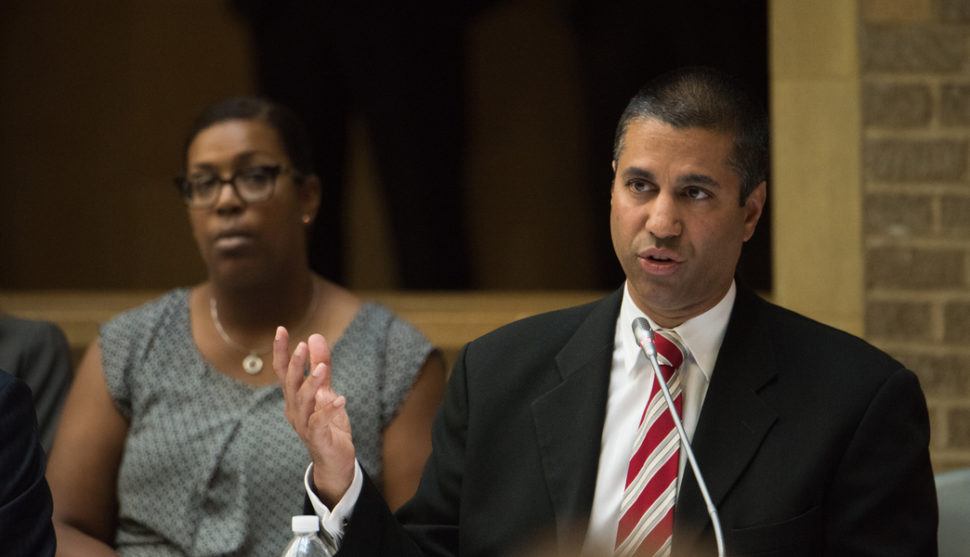FCC Chairman Ajit Pai announced the commission’s plan to eliminate net neutrality rules.
On Tuesday, Federal Communications Commission Chairman Ajit Pai announced a proposal that will likely change the way we use the Internet. Pai’s proposal moves to repeal the 2015 net neutrality rules. In the draft order issued by the FCC chair to allegedly restore Internet freedom and eliminate heavy-handed Internet regulations, he said:
“Under my proposal, the federal government will stop micromanaging the Internet. Instead, the FCC would simply require Internet service providers to be transparent about their practices so that consumers can buy the service plan that’s best for them and entrepreneurs and other small businesses can have the technical information they need to innovate.”
Pai went on to say that the former FCC chair made a mistake by bowing to pressure from President Obama. He cited that it depressed investments in building and expanding broadband networks (which has been disputed) and that it has deterred innovation.
#FCC @AjitPaiFCC announced proposal to repeal #NetNeutrality Rules. Click To TweetThe FCC has set up a December 14th vote to finalize the repeal. It is expected that the Republican-controlled FCC will likely vote 3-2 along the party lines in favor of Pai’s proposal, apparently ignoring the widespread support of internet users for net neutrality rules.
But, what are the net neutrality rules and how would it affect internet users should the FCC successfully get rid of them?
The Net Neutrality Rules and its Benefits
In May of this year, the FCC commissioners already voted 2 to 1 to repeal the net neutrality rules or Title II which was enacted in 2015. Back then, the newly appointed FCC Chairman Pai said in a statement that he wanted to return to the Clinton-era light-touch framework which he said was highly successful.
Pai’s argument received a ton of backlash from pro-net neutrality advocacy groups such as the Free Press. The group denied Pai’s claims that the Obama-era’s Open Internet Order hurt the economy. Instead, the Free Press’ study suggested that network investments had increased and accelerated since the enactment of Title II.
If you’re not aware of it, the net neutrality rules or Title II is the Internet’s guiding principle which preserves the right of every person to communicate freely online. One of its primary purposes is to ensure that the Internet enables and protects free speech.
This means that Internet Service Providers (ISPs) under Title II must not interfere with any of the content we view or post online. The same way telephone companies should not pry or hinder who we want to call or what we want to say in our phone calls.
Title II also prevents ISPs from blocking the content of their competitors. Furthermore, it ensures that broadband companies won’t charge startup companies extra just to break into the streaming video or music business.
Jason Citron, co-founder and CEO of Discord, a videogame-centric chat and video-conferencing app said to Wired:
“Net neutrality is incredibly important for small startups like Discord because all internet traffic needs to be treated as equal for us all to have access to the same resources as the big companies.”
While Discord has over 45 million users, it’s direct competition includes Skype, Hangouts, and Whatsapp. All three are owned by three of today’s most prominent tech companies. Citron and others fear that these tech giants and other large businesses will gain the upper hand by partnering with broadband providers to prioritize or subsidize their apps.
In Pai’s proposal, FCC will be stripped of its authority to regulate the Internet. Meaning, it would undercut the legal standing for the rest of the rules, including those agreed upon by the people.
Under the new proposal, the no-blocking, no-throttling, and no paid-prioritization rules would be completely stripped. This would leave broadband companies the freedom to charge Internet companies for faster online access to their customers.
Advocates of the net neutrality rules are now saying that Pai has ignored the over millions of gestures of support received for Title II last May when the commission sought public comments. He also allegedly ignored the call from Democratic Commissioner Jessica Rosenworcel to conduct a public hearing across the country before repealing the net neutrality rules.
New York AG Eric Schneiderman Slams FCC for Hindering Investigation
During the 2015 Net Neutrality proceedings, an outstanding 3.7 million public comments were submitted–largely in support of enacting Title II and net neutrality rules. This time around, after Pai first announced the roll-back of Title II, an astonishing 22 million comments were left. This time, there were far more people posting in support of repealing net neutrality.
In a response to Pai’s Tuesday announcement that the FCC would proceed in repealing net neutrality rules, New York Attorney General Eric Schneiderman posted an open letter to Ajit Pai, which you can read here.
In it, Schneiderman writes, “the process the FCC has employed to consider potentially sweeping alterations to current net neutrality rules has been corrupted by the fraudulent use of Americans’ identities.”
The AG is referring to an investigation by his office that found that many public comments were created using bots and false identities.
https://twitter.com/AGSchneiderman/status/933051001648631808
Schneiderman goes on to write, “Specifically, for six months my office has been investigating who perpetrated a massive scheme to corrupt the FCC’s notice and comment process through the misuse of enormous numbers of real New Yorkers’ and other Americans’ identities. Such conduct likely violates state law — yet the FCC has refused multiple requests for crucial evidence in its sole possession that is vital to permit that law enforcement investigation to proceed.”
In the open letter, Schneiderman presses the FCC to allow his office to investigate an act he calls “akin to identity theft, and it happened on a massive scale.” Without an investigation, the AG worries that these sort of mass manipulations of public commenting periods would happen again and again.
However, neither Ajit Pai nor the FCC has publically addressed this issue.
Repealing Net Neutrality Rules: What are the ‘Pros’?
Pai’s proposal is deemed as a victory for cable companies, telephone companies, and mobile carriers that will no longer face the regulations imposed by Title II on their broadband businesses. According to Pai, he’s not generally against the net neutrality rules. However, he’s not in favor of the utility-style legal framework which the Title II was based on either.
The current FCC chair argued that the commission’s decision to regulate the Internet as a utility failed both the consumers and businesses. He said that Internet micromanagement has cost ISPs money which barred them from investing more in connectivity expansion projects.
In an article in the Wall Street Journal yesterday, Pai wrote:
“This burdensome regulation has failed consumers and businesses alike. In the two years after the FCC’s decision, broadband network investment dropped more than 5.6%—the first time a decline has happened outside of a recession. If the current rules are left in place, millions of Americans who are on the wrong side of the digital divide would have to wait years to get more broadband.”
Pai said that more significant investments in digital infrastructure would result to more jobs, increased competition, and a better, faster, and cheaper Internet access, most especially in America’s rural areas.
However, the FCC will loosely retain the transparency aspect of the net neutrality rules. The commission said that ISPs will have an option to disclose all information regarding network management, expected network performance, and the commercial terms of their services.
All companies will also have an option to disclose all potential circumstances that would force them to block or slow down services and whether they would prioritize any of their services and content over competitors’ services. Paid priority services would also be included in the disclosure.
Should broadband companies violate their terms of services or failed to deliver any of their promises, the Federal Trade Commission would step in and take action. Allegedly, FTC will have the authority to prevent deceptive and unfair practices so that the agency can force companies to fulfill the promises they put in their terms of service.
However, as many have argued, the FTC does not have the ability to create hard-and-fast rules to limit ISPs, instead, they can only take action after the fact.
Companies like Verizon and AT&T lauded Pai’s proposal, saying that the net neutrality rules hindered them from building networks in rural areas because they were afraid the government would regulate rates or force them to open their infrastructure to competitors.
“For decades, the internet flourished under a bipartisan regulatory approach that allowed it to operate, grow and succeed free of unnecessary government controls,” Verizon’s Senior Vice President Kathy Grillo said in a statement. “It undermined investment and innovation, and posed a significant threat to the internet’s continued ability to grow and evolve to meet consumers’ needs.”



















This is really detail article on net neutrality what things I m looking for explain very well here. Thanks for sharing this article with us. But it sure if the plans of repealing net neutrality rules will change the internet.
We had net neutrality. We had it. Fuck man. Can this shit really flop flop that easily? If the democrats win next election and run the fcc can they just bring it back? Where is the line drawn? Why did America work so hard in 2015 just to be completely backhanded like this?